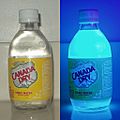Quinine facts for kids
Quinine is a natural substance found in the bark of Cinchona trees. It is a type of alkaloid, which is a group of natural chemicals. Quinine can help lower fever, fight against malaria, ease pain, and reduce swelling.
While quinine can be made in a lab, it is usually more expensive than getting it from the tree bark. Quinine was the first effective treatment for malaria. People in South America likely knew about it long before Europeans. Even today, quinine is still used for certain types of malaria, especially when other medicines do not work or are not available. It is very important for treating a serious form of malaria called malaria tropica.
Contents
History of Quinine
Long ago, the Inca people in Peru used quinine. They found it helped stop people from shivering. Europeans first learned about quinine being used to treat malaria in Rome in 1631.
In 1737, a scientist named Charles Marie de La Condamine found the best kind of quinine for treating malaria. Quinine played a role in European colonization of Africa. Some historians say that quinine helped Europeans explore and settle in places like the Gold Coast and Nigeria.
How Quinine is Used Today
Quinine has a very bitter taste. Because of this, it was added to drinks like Bitter Lemon and Tonic Water. People hoped these drinks would offer some protection against malaria. In China, quinine is sometimes added to medicines for the Common cold.
Possible Side Effects
Using quinine can sometimes cause side effects. These can include a condition called cinchonism, which might cause ringing in the ears, headaches, or blurred vision. If too much quinine is taken, it can be very dangerous. It can also cause serious problems if injected incorrectly.
See also
 In Spanish: Quinina para niños
In Spanish: Quinina para niños
Images for kids
-
Tonic water, in normal light and ultraviolet "black light". The quinine in tonic water makes it glow under black light.
 | James Van Der Zee |
 | Alma Thomas |
 | Ellis Wilson |
 | Margaret Taylor-Burroughs |





